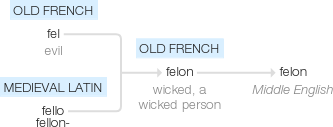Felon
Middle English: from Old French, literally ‘wicked, a wicked person’ (oblique case of fel ‘evil’), from medieval Latin fello, fellon-, of unknown origin. Compare with felon2.
wiktionary
From Middle English felun, feloun, from Anglo-Norman felun(“traitor, wretch”), from Medieval Latin fellō, from Frankish *fellō(“wicked person”), from Proto-Germanic *fillô, *filjô(“flayer, whipper, scoundrel”), from Proto-Germanic *faluz(“cruel, evil”) (compare English fell(“fierce”), Middle High German vālant(“imp”)), related to *fellaną (compare Dutch villen, German fillen(“to whip, beat”), both from Proto-Indo-European *pelh₂-(“to stir, move, swing”) (compare Old Irish ad·ella(“to seek”), di·ella(“to yield”), Umbrian pelsatu(“to overcome, conquer”), Latin pellō(“to drive, beat”), Latvian lijuôs, plītiês(“to force, impose”), Ancient Greek πέλας(pélas, “near”), πίλναμαι(pílnamai, “I approach”), Old Armenian հալածեմ(halacem, “I pursue”).
Probably from Latin fel(“gall, poison”).
etymonline
felon (n.)
c. 1300, "one who deceives or commits treason; one who is wicked or evil; evil-doer," used of Lucifer and Herod, from Old French felon "evil-doer, scoundrel, traitor, rebel, oath-breaker, the Devil" (9c.), from Medieval Latin fellonem (nominative fello) "evil-doer," which is of uncertain origin, perhaps from Frankish *fillo, *filljo "person who whips or beats, scourger" (source of Old High German fillen "to whip"); or from Latin fel "gall, poison," on the notion of "one full of bitterness." Celtic origins also have been proposed.
Another theory (advanced by Professor R. Atkinson of Dublin) traces it to Latin fellare "to suck" (see fecund), which had an obscene secondary meaning in classical Latin (well-known to readers of Martial and Catullus), which would make a felon etymologically a "cock-sucker." OED inclines toward the "gall" explanation, but finds Atkinson's "most plausible" of the others.
Also by c. 1300 in English in a general legal sense "criminal; one who has committed a felony," however that was defined. Century Dictionary notes, "the term is not applicable after legal punishment has been completed." In Middle English it also was an adjective, "traitorous, wicked, malignant." Australian official James Mudie (1837), coined felonry "as the appellative of an order or class of persons in New South Wales,—an order which happily exists in no other country in the world."
